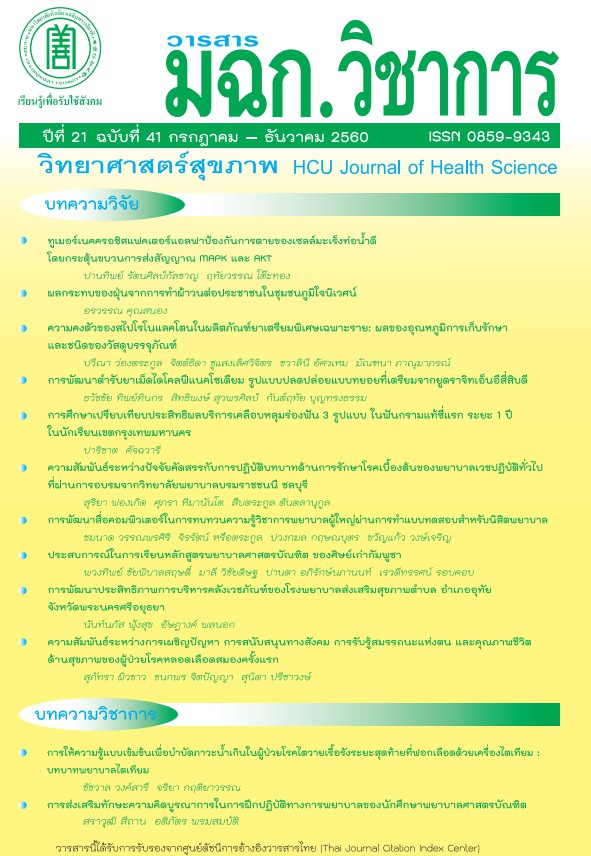TNF-alpha Confers Apoptosis Resistance to Cholangiocarcinoma Cells by Activating MAPK and AKT Signaling
Keywords:
TNF-alpha, MAPK, AKTAbstract
The objective of this study was to understand what made cholangiocarcinoma an aggressive cancer and why it is resistant to conventional therapy. Specifically, we aim to determine why, unlike many cancer cell types, cholangiocarcinoma cells are tolerant to killing induced by TNF-alpha. Here, the underlying mechanism of this tolerance was investigated using KKU-100, a cholangiocarcinoma cell line derived from a Thai patient as a model. Treatment with TNF-alpha up to 80 ng/ mL had no significant effect on KKU-100 cell viability as determined by MTT assay. However, increasing concentrations of TNFalpha enhanced pMAPK1/2 and pAKT levels, suggest that activation of MAPK and/or AKT signaling pathways might be responsible for tolerance to TNF-alpha-induced cell death. This idea was tested by blocking the MAPK or AKT signaling pathways with U0126 or LY294002, a MEK1/2 or an AKT inhibitor, respectively, and assessing the effects of this blocking in the TNF-alpha-treated KKU-100 cells. The results showed that the combination therapy significantly reduced cell viability in KKU-100 cells compared to monotherapy with TNF-alpha or the inhibitor alone. In addition, significantly more apoptotic nuclei were induced as shown by nuclear staining with DAPI. Together, results of this study show that MAPK and AKT signaling pathways were activated by TNF-alpha and this may be an important attribute to TNF-alpha tolerance which underlies the aggressiveness in cholangiocarcinoma cells.
Downloads
Downloads
Published
How to Cite
Issue
Section
License
บทความที่ได้รับการตีพิมพ์เป็นลิขสิทธิ์ของวารสารวิทยาศาสตร์สุขภาพและสุขภาวะ
ข้อความที่ปรากฏในบทความแต่ละเรื่องในวารสารวิชาการเล่มนี้เป็นความคิดเห็นส่วนตัวของผู้เขียนแต่ละท่านไม่เกี่ยวข้องกับมหาวิทยาลัยหัวเฉียวเฉลิมพระเกียรติ และคณาจารย์ท่านอื่นๆในมหาวิทยาลัยฯ แต่อย่างใด ความรับผิดชอบองค์ประกอบทั้งหมดของบทความแต่ละเรื่องเป็นของผู้เขียนแต่ละท่าน หากมีความผิดพลาดใดๆ ผู้เขียนแต่ละท่านจะรับผิดชอบบทความของตนเองแต่ผู้เดียว




